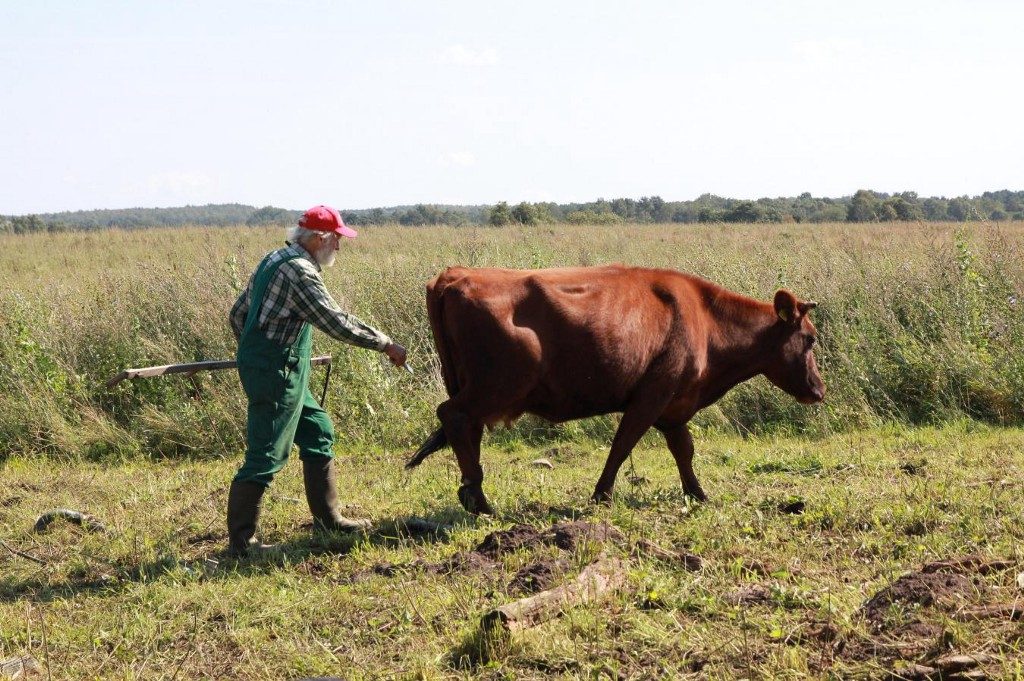Phie
Ambo directed the film “Mechanical Love,” which was in the Joris Ivens
competition in 2007. It has screened at 15 film festivals and won two first prizes. In 2005 she directed the film “Gambler,” which was in competition
at the Rotterdam Film Festival and has won several awards. In 2012, her latest and most famous film, “Free the Mind,” was released. (Press materials)
Malene Flindt Pedersen has been a producer at Danish Documentary Production since 2012 after leaving the craft of production for a while to work as Head of Development, Short and Documentary at The Danish Film Institute from 2006–2012. Prior to working at the Film Institute, she had produced a number of creative feature documentaries for cinema and documentary TV series. (Danish Documentary)
“Good Things Await” will premiere at the 2015 SXSW Film Festival on March 15.
W&H: Please give us your description of the film playing.
PA: The film is about rediscovering how we used to farm according
to Mother Nature’s rhythms, and not so much according to high efficiency and low
costs. The film spotlights one of the founding fathers of the New Nordic Kitchen, Niels Stokholm, who insists on farming in his own biodynamic style, even though the authorities try to shut him down. It’s really a story about the specific time in which we live, where old industrial values are being challenged by holistic and
sustainable systems.
W&H: What drew you to this story?
PA: I went to visit the farm with my youngest daughter, and I just
fell in love with the whole atmosphere there. To me, it was
important to spend time there to reconnect with the same kind of feeling most people
have as children, when you feel completely one with the bugs and the butterflies. I
spent a year recording before I got my producer Malene Flindt on board, and we
began to talk about what kind of film I was making. All in all, I shot for two and
a half years, and then we started the editing process.
W&H: What was the biggest challenge in making the film?
PA: It was pretty difficult to convince Niels that the conflict with the authorities was an important part of the film. He
would have preferred if it had not been in the film, which forced me to find another, subtler way of telling this story.
I am actually very pleased with the
unorthodox dramaturgy of the film. The film’s conflict is introduced within 30 minutes, which is normally a complete no go. We did this to stress that the film is
about something bigger than the conflict with the authorities. It’s about trying to understand the bigger picture: Humankind is part of nature, not working against it.
W&H: What do you want people to think about when they are leaving the theatre?
PA: I want them to remember what they felt like as a child and take that back with them. Hopefully, this will remind the audience exactly why we have to take better care of our surroundings.
W&H: What advice do you have for other female directors?
PA: The kind of challenges we face as female
directors are very dependent on where we live. Personally, I am from Denmark and, of course, it still affects me that women are not really treated the same way as men in
different situations, but it’s nothing compared to what my colleagues in other
countries are facing.
I think what is universal, though, is the importance of making films as
true as you can under the circumstances. Even films shot on an iPhone can
be very strong if the director has a strong voice. So don’t worry about making
films that look like films. Truth can arise in very surprising ways.
W&H: What’s the biggest misconception about you and your work?
PA: I don’t feel misconceived. I am actually surprised that audiences understand my films most of the time!
W&H: How did you get your film funded? Share some insights into how you got the film made.
MFP: We are very lucky
in the Scandinavian countries because we have film institutes that prioritize
documentary films. Our film was funded by the Danish Film Institute and the Nordic Film and Television Fund, as well as The Media Broadcasting Program.
We have also made presales to SVT, YLE,
RUV, BOS, TVP, and DR. Phie had been filming for more than a year before we
presented it to financiers, so we had very good material to show them
and Phie knew exactly what kind of film she wanted to make. We pitched it at
Cph:dox and Nordic Forum Work-In-Progress Pitch. That helped us a lot.
W&H: Name your favorite woman-directed film and why.
PA: Right now, I think that Laura Poitras is the
perfect example of a very sensitive filmmaker who has made a film about a
dangerous and difficult subject that traditionally would be told by male directors. She manages to get both sides of Edward Snowden in “Citizenfour.” That’s what
makes the film so intense and interesting. Her voice and sensible camerawork
make a wonderful contrast to the hard and tough story of Snowden.






